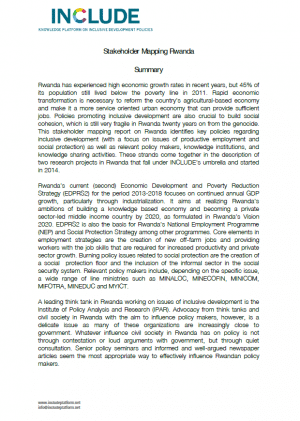
This report focuses on inclusive development in Kenya. It looks at the challenge of inclusive development in the country evident in unemployment, especially among the youth, and informalisation of work. It further discusses how to address the challenge of inclusive employment; the government has initiated a number of policy interventions. This report shows how the Kenya Vision 2030 and the five year Medium Term Plans provide a broad framework in which social, economic and political policies to address inclusive development challenges in the country are anchored. In addition, more specific productive employment policies – including the National Diaspora Policy, the Micro and Small Enterprises Act, the Labour Relations Policy, Foreign Employment Policy, National Policy on Youth Polytechnics and the Vocational Sector, the National Youth Policy, the Private sector Internship and Training Policy, Private Sector Capacity Building Policy and the Employment Policy and Strategy for Kenya – are discussed. This report is also about another focus area within inclusive development: social protection. The report shows how, in recognition of the fact that social protection in Kenya is being addressed in many different forms, by different agencies and through different sectoral interventions, a National Social Protection Policy was enacted in 2012 and a National Social Security Fund Pension Scheme Act in 2013.










